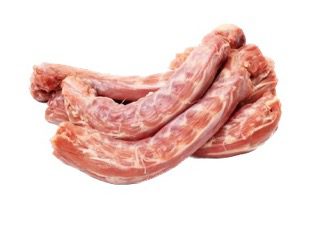

Including duck necks in a dog’s diet is safe as they provide omega-3 fatty acids, selenium, and zinc. However, overfeeding can lead to nutritional imbalance in dogs.
Duck necks are packed with B vitamins, zinc, selenium, and omega-3 fatty acids that help boost the immune system, promote skin and coat health, and support joint health. Chewing on duck necks also promotes good dental health and keeps dogs mentally stimulated.
Cooked bones can splinter and cause rectal bleeding and intestinal blockage. Overfeeding on duck necks can lead to nutritional imbalance in dogs.
Duck necks can be given raw or as dehydrated dog treats. If your dog’s diet already includes complete calcium, limit edible bones or only feed them as occasional treats. Give one duck neck treat 1-3 times per week and always supervise your dog when feeding bones.
Duck necks are a popular raw food option for dogs. They are high in protein, calcium, and other essential nutrients that help to support strong bones, teeth, and muscles. Additionally, the chewing action required to consume the necks can help to promote healthy dental hygiene.
However, there are some risks associated with feeding duck necks to dogs. The bones can be quite small and brittle, which means they can easily splinter and cause choking or internal damage if swallowed. Additionally, duck necks can harbor harmful bacteria like salmonella, so it's important to handle them carefully and ensure they are properly cooked before feeding them to your dog.
In extreme cases, if your dog has swallowed a piece of bone or is showing signs of choking or distress, it's important to seek veterinary attention right away. To avoid these risks, consider feeding your dog safer alternatives like raw meaty bones or dental chews.
A serving idea for edible duck necks is to simply offer them to your dog as a snack or treat. However, it's important to monitor your dog while they are consuming the necks to ensure they are chewing them properly and not swallowing large pieces.